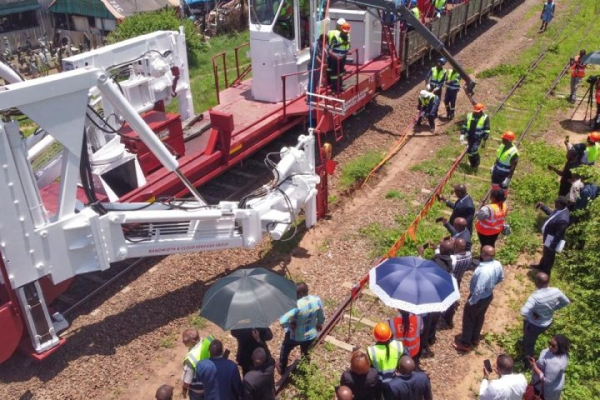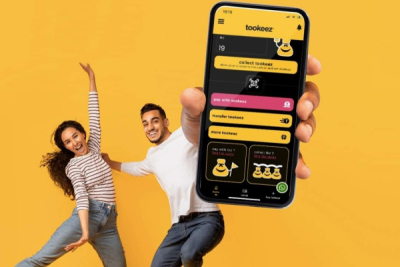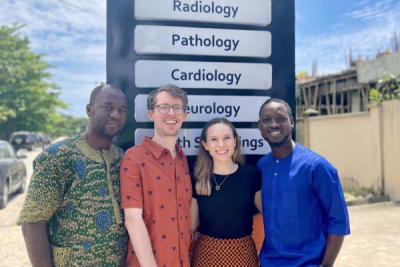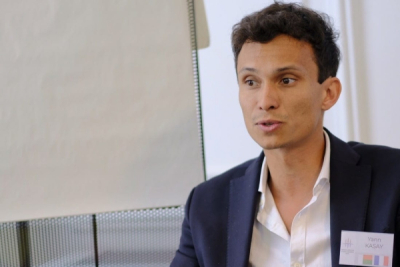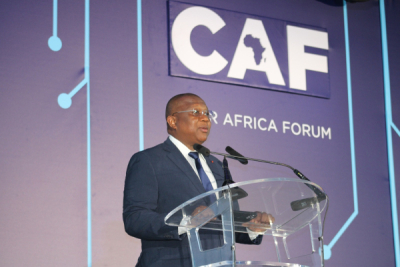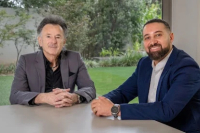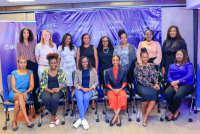Broadband is central to Zimbabwe's development agenda, which is centered around digital transformation. In collaboration with the private sector, the government aims to bolster the national telecommunications infrastructure to ensure affordable Internet access for all citizens.
The Zimbabwean government announced on Thursday, March 7, the commencement of the second phase of the fiber optic rail project. The project, executed by wholesale telecoms infrastructure provider Bandwidth & Cloud Services Group (BCS), aims to enhance connectivity within Zimbabwe’s cities by deploying fiber along national railroads.
This phase will extend fiber optics over 800 km, connecting the village of Somabhula to the capital Harare via the town of Gweru. It will also span the Bulawayo - Plumtree and Harare - Mutare routes. The first phase of the project, initiated in 2022, has already laid 1,180 km of fiber from the border town of Beitbridge in Matabeleland province to the city of Victoria Falls, in the north of the country. The network infrastructure costs $18 million, and the second phase is projected to incur a similar expense.
The project aligns with the government’s strategic goal of transforming Zimbabwe into a self-sufficient and prosperous upper-middle-income society by 2030, leveraging digital technology. It also corresponds with the national broadband program for 2023-2030, which encompasses several state and privately financed infrastructure deployment projects. This program is expected to accelerate broadband penetration in the country and reduce costs.
Ultimately, the fiber optic system will cover the country's entire rail network, from Rutenga to Chikwalakwala, before extending into Zambia and other regions. According to the Honourable Owen Ncube, Minister of State for Provincial Affairs and Decentralization, this project ensures that Zimbabwe will be connected to the rest of the world, marking a positive stride in the “Leave no one behind (LNOB)” principle enshrined in the 2030 Agenda for Sustainable Development and its Sustainable Development Goals (SDGs).
Samira Njoya
Following a philanthropic stance, Zafy Tody provides its expertise and financial support to a select group of Malagasy startups annually, without seeking equity or future ownership rights in the supported companies.
Zafy Tody, a Malagasy tech startup incubator and business angel, offers free incubation and funding to selected startups without taking equity stakes. Founded in 2019 by Andréa Zafitody Li-Sai Chimento and CEO Manambina Ramaroson Vandewalle, the incubator aims to boost Madagascar's startup ecosystem.
Each year, Zafy Tody offers free incubation to 5 to 10 Malagasy startups, providing financing without any equity investment or future ownership stake in the company. For other Madagascar-based start-ups, the incubator offers a paid program for personalized support.
Its 12-month incubation program allows beneficiaries to validate their business plan, test their product, bring it to market, and prepare for fundraising or competitions. Incubated startups also gain access to Amazon Web Services' AWS Activate program.
In 2023, Zafy Tody supported startups selected for the Miary Digital program, including E-voyage, Andao Share, NextFoodAfrica, and Zion. Partners include Orange Fab Madagascar, NextA Accelerator, LivePlan, the Center for Excellence in Entrepreneurship, and the French Embassy in Madagascar.
To cater to companies or individuals seeking to enhance their skills in entrepreneurship and digital transformation, the incubator offers professional training programs. These include training in UX & UI (user experience and interface), entrepreneurship, and the tech tools and solutions offered by the AWS cloud platform.
Zafy Tody has established several partnerships to aid in its mission. It is supported by Orange Fab Madagascar, NextA Accelerator, LivePlan, a business planning solution, the Center for Excellence in Entrepreneurship, and the French Embassy in Madagascar, among others.
Melchior Koba
Moroccan fintech startup Tookeez said on Thursday it secured $1.5 million in a funding round. The company plans to use the proceeds to expand its presence in Morocco before entering North Africa, the Middle East, and ultimately the broader African continent.
Nigerian e-health startup MDaaS Global announced Wednesday it has raised $3 million in a pre-Series A funding round. The company plans to use the capital to enhance its technology and expand its BeaconHealth Diagnostics network across all 36 states of Nigeria.
Despite his background in business and marketing, he has carved out a niche for himself in the technology sector, focusing on solar innovation in Madagascar. He offers innovative and sustainable solutions to address the increasing electricity demand.
Yann Kasay (photo), a tech entrepreneur and consultant from Madagascar, is the founder of Jirogasy, a company that designs, assembles, and manufactures solar home systems and Internet of Things (IoT) devices powered by solar energy locally.
Established in 2017, Jirogasy has developed a range of innovative distributed solar stations. “We import only the raw materials. All parts, especially electronics, are printed with a three-dimensional printer we designed ourselves, and assembly is done in our workshop,” Kasay explained in 2019.
In the same year, Jirogasy, in partnership with AccesMad, a French non-governmental organization dedicated to developing scientific and technical education in Madagascar, launched Jirodesk, a solar-powered generator with an integrated mini-laptop.
In 2022, Kasay launched Jiro France, a design office of Jirogasy. The office offers services to technology and industrial groups looking to develop a hardware project.
In addition to his role at Jirogasy, Kasay also undertakes temporary assignments as a strategy and market intelligence consultant, aiming to assist large companies and startups in their decision to implement innovation and new software products.
The cleantech entrepreneur studied commerce and international business at the Paris School of Business, business administration and management at Paris-Sud University, and marketing at Washburn University.
In 2015, he co-founded International Studies Solutions, where he served as COO until 2018. The company advises athletes and students on their projects abroad. Before becoming an entrepreneur, he worked for MCA BENELUX, a European engineering and technology company, as an IT business manager between 2014 and 2015.
In 2018, Jirogasy was selected as one of the 100 startups in the Marathon Pitch at the Salon des entrepreneurs. In 2019, Kasay was named Young Leader by the French-African Foundation.
Melchior Koba
The 4th edition of the Cyber Africa Forum (CAF) is set to take place in Côte d’Ivoire on April 15 and 16. This year’s theme, “Cyber risks and artificial intelligence: what defense strategies in the face of new digital threats?” aims to foster strategic discussions on the role of AI in enhancing cybersecurity and the challenges it poses.
Seven months ago, Sonatel acquired the super broadband license for almost $57 million. It aims to revolutionize usage in the local telecoms market and remain the leading operator.
The commercial fixed 5G connectivity offers of Sonatel, 42.33%-owned by Orange, are now available for residential and business customers in Senegal. The telecom company announced in a press release on Tuesday, March 5, that it would soon be expanding its services to include mobile internet offers for ultra-high-speed broadband.
With the advent of 5G, Sonatel promises its customers instantaneous download and streaming speeds, as well as enhanced responsiveness for real-time applications such as online gaming, virtual reality, telemedicine, e-education, among others. The company is inviting customers to explore the “boundless possibilities” of the technology at a dedicated laboratory at the Orange Digital Center in Dakar.
The launch of Sonatel’s commercial 5G comes seven months after the company secured Senegal’s first ultra-broadband license from the local telecom regulator, ARTP, for XOF34.5 billion ($57 million). The telecom firm has been preparing for the deployment of the technology since 2020, confirming its readiness through a successful test in December 2021 and launching its 5G laboratory in July 2022.
In the 5G market, Sonatel leads its main competitors, Expresso Sénégal and Saga Africa Holding Limited (Free), the latter of which obtained its operating license in December 2023 for XOF13.5 billion.
This advantage positions Sonatel to boost its revenues and solidify its leadership in the Senegalese telecom market. As per ARTP data, Orange had 12.5 million mobile telephony subscribers in the third quarter of 2023, accounting for a market share of 56.47%. Expresso and Free held 16.8% and 23.89% of the national mobile subscriber base, respectively. In the internet segment, Orange commanded a market share of 66.52%.
Isaac K. Kassouwi
African initiatives to support the technology sector are increasing in response to a decline in funding. These initiatives aim to bolster the continent's fast-growing tech industry.
Conducive Capital, a South African venture capital firm, was inaugurated in Johannesburg on Tuesday, March 5. The firm, founded by Clive Butkow (photo, left), former CEO of Kalon Venture Partners, and Mitchan Adams (photo, right), co-founder of Ozow and CEO of Aions Creative Technology, aims to invest in early and growth-stage start-ups across Africa.
The firm plans to raise its first capital of $15 million in July, with a target to close a fund exceeding $50 million within 24 months. "And we go beyond just monetary investments. Alongside funding, Conducive Capital pledges comprehensive support, offering strategic guidance, operational expertise, and mentorship to nurture start-ups, facilitating their growth into industry frontrunners," said Mitchan Adams.
The establishment of Conducive Capital comes amidst a decline in funding for the African technology ecosystem in 2023. However, several initiatives have emerged across the continent, including Sawari Ventures for North African and Middle Eastern start-ups, and Timbuktoo, funded by the United Nations Development Program and African countries. The African Development Bank has also approved a $10.5 million stake in Seedstars Africa Ventures to bolster its investments in sub-Saharan African startups.
Despite a slow start to the new year with $77 million raised by African startups in January 2024, funding nearly tripled to $217 million in February, according to Africa: The Big Deal, a database tracking startup financing in Africa. The influx of new venture capital entities and the closing of Partech’s second African fund at over $300 million signal promising prospects for the African technology ecosystem.
Adoni Conrad Quenum
With programs like Newbie and Cracker, Enovation Factory is shaping a new generation of entrepreneurs, guiding them from the early stages of ideation through to the execution of their concepts.
Enovation Factory, an African startup support institution based in Cameroon, is committed to fostering the next generation of African leaders. The organization provides project leaders with the necessary knowledge, attitude, and skills to shape the future of Africa, as stated on its website.
The organization offers its services free of charge, relying on a network of partners to provide the necessary resources for its operations. It offers two main programs, namely Newbie and Cracker.
Newbie is an incubation program aimed at accelerating the growth and success of entrepreneurs in the ideation stage. In contrast, Cracker is an acceleration program for entrepreneurs who have completed their business plans. This program offers startups intensive support, specialized resources, and opportunities for rapid development.
The organization’s program application portal is currently open to all project leaders in Cameroon. Both the Newbie and Cracker programs run for six months. They provide participants a workspace for collaboration with other entrepreneurs, mentoring sessions for advice and sector expertise, and access to a network of entrepreneurs, investors, experts, and potential partners.
In addition, Enovation Factory offers workshops, seminars, and training courses to equip beneficiaries with the skills and knowledge required to build and develop their projects. The organization also facilitates investment by organizing pitching events and connecting startups with investor networks interested in funding opportunities.
Enovation Factory’s partner network includes both local and international institutions such as Google Cloud, Eagle Consulting Group, Hilton Hotels & Resorts, Creative Valley, Qwasar Silicon Valley, and The Network.
Melchior Koba
The International Finance Corporation (IFC) announced 100 women-led startups selected for its “She Wins Africa” program, designed to provide coaching, training, and financing to accelerate growth in sub-Saharan Africa.
"IFC's She Wins Africa empowers women entrepreneurs through coaching, training, and financing, accelerating their growth and investment readiness throughout sub-Saharan Africa," said Nathalie Akon Gabala, IFC’s Director of Gender and Economic Inclusion.
More...
MoneyHash, an Africa and Middle East-based fintech startup specializing in payment orchestration, last week announced the closure of a $4.5 million seed funding round. The company plans to use the capital to enhance its technology and expand within the MEA region.
A computer scientist by training, he designs technological solutions to make life easier for businesses, institutions, and individuals. Through Maviance, he has developed several digital payment solutions.
Jerry Cheambe (photo), a Cameroonian technology entrepreneur and computer scientist, founded Maviance, a technology company, in 2010 after earning a degree in Business Administration and Computer Science from the Technical University of Berlin in 2004.
Based in Germany and operating in Europe and emerging economies, Maviance offers customized solutions, value-added services, and specific web and mobile solutions for telecoms, utilities, financial institutions, enterprises, and governments. The company has developed several technology solutions, including Smartcash, Mavimeter, and SMobilpay.
Smartcash is a comprehensive solution that digitizes corporate payment flows and optimizes business processes, offering users in the CEMAC region (Economic and Monetary Community of Central Africa) an efficient and transparent transaction experience through high flexibility, real-time reporting, and direct access to banks.
SMobilpay is a secure digital payment solution that simplifies bill payment for consumers and businesses in the CEMAC region, providing agency-free, value-added, and cashless payment options to governments, financial institutions, businesses, operators, and customers.
Mavimeter is a technology solution designed for smart meter reading, addressing the infrastructure challenges of gas, water, and electricity utilities in emerging markets. It aids administrators in reducing error risk, detecting fraudulent activity, and enhancing the efficiency and performance of subcontracted field operatives.
Before his entrepreneurial venture, Cheambe worked as a software engineer at Fraunhofer FOKUS, a German company developing communication infrastructure solutions, from 2003 to 2004. In December 2004, he joined Accenture, an international company focused on talent and innovation, as head of systems integration and technology, where he worked until 2010.
Melchior Koba
The social network focused on content sharing and online learning was founded by Abdoulaye Mbengue, a tech entrepreneur with decades of project management experience. The platform allows users to connect based on shared interests and access user-generated courses.
TooShare, a social networking platform developed by a Senegalese startup, allows users to share a variety of content, including photos, videos, and documents, and to create or access online courses. The platform, launched in 2021 by Abdoulaye Mbengue, is available as an Android mobile application.
After downloading the app and creating an account, users provide information about their interests. This allows them to access a personalized news feed featuring content from users with similar interests. They can share text, photos, videos, or documents, and access Eduspace, an area dedicated to online classes.
Eduspace offers courses in various subjects, including coding, marketing, mathematics, and graphic design. In 2023, TooShare helped Senegalese students prepare for end-of-year exams amid school disruptions caused by political demonstrations.
Users can create quizzes, share lessons, form discussion groups, or start online classes by clicking the “Create” button. They can add content to enhance their online classrooms, potentially attracting other users interested in learning. Since its launch, TooShare’s Android app has been downloaded more than 10,000 times, according to Play Store statistics.
Adoni Conrad Quenum
A travers son programme d’accélération, PesaTech Accelerator s’efforce de renforcer l’écosystème des fintechs en facilitant les investissements, les partenariats et l’autonomisation entrepreneuriale.
PesaTech Accelerator est un accélérateur de start-up conçu pour aider les entreprises fintech en phase de croissance ou post-revenu en Tanzanie. Lancé en 2022 par le Fonds d’équipement des Nations unies, il s’engage à améliorer la capacité des fintechs à attirer des investissements par le biais d’un programme de préparation des investisseurs (IRP) tout en servant d’intermédiaire entre les start-up, les partenaires stratégiques et les investisseurs.
PesaTech Accelerator, à travers son programme d’accélération, veut autonomiser les entrepreneurs fintech et favoriser des solutions durables et impactantes pour la communauté. Il soutient les fintechs qui résolvent les défis numériques dans les domaines du paiement, de l’épargne, du prêt, de l’investissement, de l’assurance et du commerce électronique. Les start-up lauréates du programme reçoivent un soutien technique et commercial sur mesure afin d’améliorer la qualité de leur projet.
Le programme d’accélération de PesaTech Accelerator dure trois mois. Il comprend des ateliers physiques mensuels de quatre jours, suivis de sessions virtuelles et de mentorats. Par ailleurs, les entreprises reçoivent aussi un soutien post-programme de trois mois. Ce qui permettra de combler les lacunes opérationnelles, d’améliorer les dossiers d’investissement, de fournir un mentorat et de favoriser les partenariats visant à accélérer la croissance des entreprises fintech.
De plus, l’accélérateur organise des événements de mise en réseau des investisseurs ainsi que des journées de démonstration. Avec ses partenaires Digital for Tanzania, Anza Entrepreneurs, NMB Bank et Village Capital entre autres, il a soutenu plusieurs start-up.
Lors de la première cohorte de son programme, PesaTech Accelerator a accompagné Bizzyn, Dawa Mkononi, et plus encore. Bizzyn, par l’intermédiaire de BizzyPay, aide les petites et moyennes entreprises qui n’ont pas d’antécédents en matière de crédit à accéder facilement au financement. Dawa Mkononi est une application de commerce électronique qui permet aux pharmacies, aux dispensaires agréés et aux établissements de santé d’acheter des produits pharmaceutiques en ligne.
Melchior Koba
Lire aussi:


